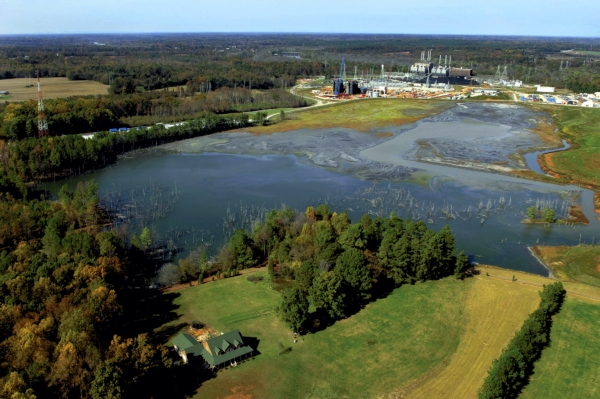Coal ash public hearing scheduled for Tuesday
Published 12:10 am Sunday, March 20, 2016

- A November 2010 aerial photograph of the first holding basin that was being used to hold the coal ash from the coal-fired Buck Steam plant seen in the background. JON C. LAKEY / SALISBURY POST
By Josh Bergeron
josh.bergeron@salisburypost.com
Rowan residents on Tuesday will have their chance to weigh in on the future of coal ash ponds at Buck Steam Station.
The public hearing is designed to address risk classifications for the steam station’s three impoundments, which have been preliminarily rated low-to-intermediate risk. The ratings, however, will ultimately decide whether coal ash stays in Rowan’s Dukeville community or is excavated.
Only high and intermediate-risk ponds must be excavated, according to state law. High-risk ponds must be closed by December 2019. Intermediate risk ponds must be closed by December 2024. If declared low risk, Buck Steam Station’s could capped in place and closed as late as December 2029.
The North Carolina Department of Environmental Quality has scheduled a public hearing for Buck Steam Station at 6 p.m. Tuesday in room 300 of the Catawba College Center for the Environment — 2300 West Innes Street. Attendees who wish to speak during the public hearing are asked to register starting at 5:30 p.m.
Buck Steam Station’s public hearing is required by the 2014 Coal Ash Management Act, which will also requires scientific data be used in the closure process. The state law, however, led to a cascading series of events that have left local residents unsure what to do with water from private wells.
State officials in April 2015 first declared the water from a portion of private wells in Dukeville unsafe to consume. In the following months, state regulators declared more wells unsafe to drink. Most wells violated state-determined thresholds of hexavalent chromium and vanadium, which are heavy metals that can cause health problems when consumed in large enough amounts.
In the ensuing months, Duke Energy, which owns and operates Buck Steam Steam Station and its surrounding land, contended the chemicals causing the unsafe water were naturally occurring. Environmentalists have said the chemicals occur in the environment but not at the amounts seen in Dukeville wells.
Despite its contention, Duke has provided regular deliveries of bottled water.
State officials have levied violations against Duke during the previous year for leaking wastewater at coal ash facilities. The same state officials, however, recently declared well water safe to drink in Dukeville and other sites across North Carolina.
In a previous interview with the Salisbury Post, State Health Director Dr. Randall Williams said the state would lift its “do not drink” recommendations because private well water near coal ash ponds would be allowed, in most cases, in municipal systems. Williams said the state plans to raise its standard for vanadium by 66 times its current amount, from 0.3 parts per billion for vanadium to 20 parts per billion.
“We have determined your water is as safe to drink as water in most cities and towns across the state and country,” states a letter sent to neighbors of coal ash ponds. “It is appropriate to return to drinking and using your water for cooking, bathing and other household uses.”
The letter was signed by Williams and DEQ Assistant Secretary for the Environment Tom Reeder.
Dukeville residents such as Deborah Graham, however, say they’ve been advised by Rowan County health officials not to drink the water.
The letter sent to coal ash neighbors state the initial “do not drink” recommendation was only a “cautious recommendation.
“In fact, the recommendation regarding one of the elements is based on a potential one in a million cancer risk for an average person consuming well water every day for more than 70 years.”
For coal ash ponds, Duke and DEQ officials have said the cap in place option would be a safe way to store ash. However, the priority rating associated with the cap-in-place option could leave Buck Steam Station’s coal ash ponds unchanged for 13 more years.
For those unable to attend the public hearing, DEQ is also accepting emailed or written comments until April 18. Written comments can be submitted to: N.C. Division of Water Resources, Groundwater Protection Section, N.C. Department of Environmental Quality, Attn: Debra Watts, 1636 Mail Service Center, Raleigh, N.C. 27699-1611. Comments sent via email should be addressed to buckcomments@ncdenr.gov.
Contact reporter Josh Bergeron at 704-797-4246.




